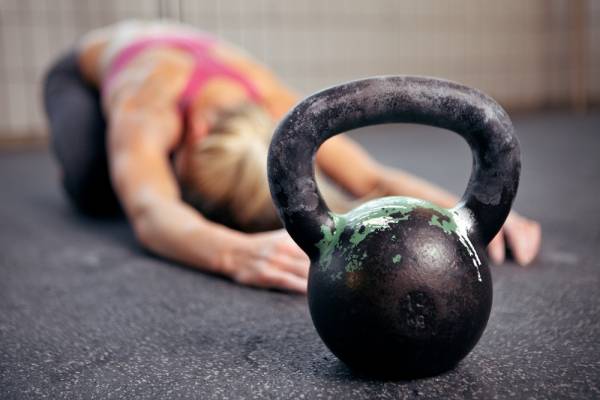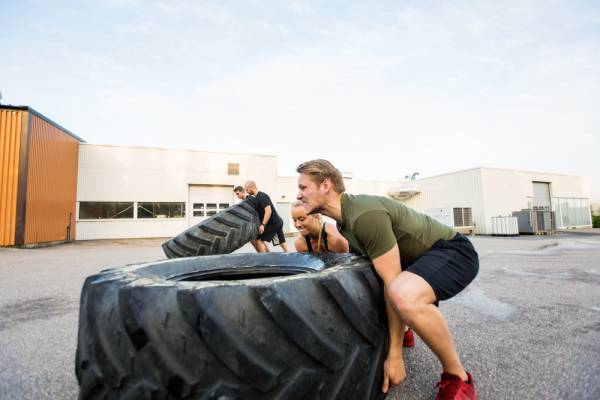In sport, fitness, and even life, few words are more feared than the word plateau. The frank reality is that one day soon something in your life will get old and boring.
Growth will seem to cease, dry up, or diminish. Jobs can become uninspiring, relationships get stale, and even the physical activities we love can start to feel repetitive and pointless.
In fitness, when we stop progressing, we know we have arrived in Plateau City. While plateaus may seem like a welcome companion on a long bike ride or when you’re looking for a nice place to set your tent while camping, when it comes to fitness, hitting a plateau downright stinks.
Stop and Take a Week (or Two) Off
There are plenty of ways to delay the plateau. Such diversions are called tactics. Implementing super slow or speed training are examples of such tactics. And certainly we should apply such training tactics as an appropriate part of our exercise programs.
“Getting bigger, faster, and stronger may be the byproduct of exercise in the short term, but long-term success is all about tapping into what drives you.”
But while tactics are effective on a short-term basis, they simply delay the inevitable. Better than delaying a plateau is to turn and pay attention to the signals – and then stop. Your body is telling you that it needs a rest, so why not simply pull over for a while?
Breaks give us perspective, the ability to rest and heal, and the opportunity to recharge the batteries. If rest doesn’t do the trick, perhaps taking a break is still a chance to evaluate if something deeper is going on.
Periodize Your Workouts
Athletes don’t stay in a perpetual state of competition. They first prepare, then compete, then they transition. This is called the macrocycle when it comes to periodization in training.
“In life, infinite growth is a farce and this most certainly is true in fitness, as well.”
Within a macrocycle are several mesocycles that last between two to six weeks depending on the discipline. In fitness, a common cycle is the ninety-day period. Unless you’re brand new to exercise or you’ve been on a long hiatus, odds are the ninety- to 180-day window is more or less the window in which you’ll find yourself atop that plateau.
In life, infinite growth is a farce and this most certainly is true in fitness, as well. Growth in the long run only occurs through change like periodization. Life itself is a cycle and your exercise should reflect it.

Hire a Coach, Trainer, or Therapist
Drawing up weeks of training plans can be tedious and painstaking. It’s much easier to default to what you already know (which got you to that plateau, remember?).
If you can afford an on-going coach, then she may do the periodizing for you. But at the very least you should hire a coach on a one-time basis to show you some new concepts and detail an action plan you can take with you.
But the nuts and bolts of training specifics is only half the battle. While it may seem absurd to consider a therapist to be a training specialist, remember that “90% of the game is half mental.” Whether Yogi Berra had his math correct or not, if your training is on point, perhaps it’s your attitude that needs the adjustment.
“Whether Yogi Berra had his math correct or not, if your training is on point, perhaps it’s your attitude that needs the adjustment.”
A sports psychologist or counselor can see beyond the sets and reps to what is really blocking you from becoming your best. I’m a firm believer that the physical manifests itself in the mental and vice versa. There’s a lot more to racing than simply working on what’s under the hood, fueling the engine, and driving the vehicle.
Slow It Down, Rest, and Recover
While plateaus can be a reality for any athlete, they are likely for those who over train. I worked with a competitive Ironman triathlete who paid thousands of dollars to work with a well-known coach. The coach’s advice to her was to stimulate increased enzyme activity by doing low-level cardio. When I say low level, I’m talking about a leisurely walk or slow bike ride.
It was comical to watch this high-level athlete sitting on the recumbent bike barely pedaling in preparation for a world-class racing event, but that’s exactly what she did. Many athletes know how to push, but sometimes they are not as adept at knowing how to slow it down.
Examine Your Fuel
I don’t care how solid your training methodology is, if your fueling is off, your results will suffer. According to the American College of Sports Medicine, people who exercise at any level should get at least 50-60% of their calories from carbs. This may come as a shock to those who’ve hopped on the anti-carb bandwagon, but this most certainly isn’t news to athletes.
When you fuel is also vital to your success. For instance, eating protein post workout is not the only essential element of building muscle. According to a recent study, the best results in optimizing muscle come from eating protein throughout the day.
Switch It Up
Sometimes a plateau is deeper than just diminished results. Sometimes a plateau is a signal that something needs to change. Pain is a sure fire way to determine if this is the case. If exercise brings you pain, not only do you need a rest, you need a change.

A fresh start might mean getting out of the box to try a new sport or different physical activity. Many athletes do exactly that in the off-season or as a training complement to their existing routine. Former NFL wide receiver Lynn Swann practiced ballet. Soccer superstar David Beckham took up fencing.
“Finding joy, fun, and passion in your fitness is essential to continued success.”
Practice makes perfect, but sometimes repeating the same sport and exercise patterns also causes breakdown. A different activity might be what you need to find balance, proficiency, and a breakthrough in your core competency.
Bring It Back to Your Foundation
For many, exercise seems to be synonymous with the word results. Getting bigger, faster, and stronger may be the byproduct of exercise in the short term, but long-term success is all about tapping into what drives you.
Finding joy, fun, and passion in your fitness is essential to continued success. Perspective is a big help when joy is lacking. Find humility in trying new activities. Find gratitude by volunteering your expertise to those who are less fortunate. Exercise with friends and family. Take the kids on a hike or a walk through the city.
Seeing the world through different eyes does wonders for finding meaning and purpose in your life’s work, whether it’s the boardroom or the weight room.
Read more about moving past a plateau:
- 7 Essential Elements of Rest and Recovery
- How Your Recovery Relates Directly to Your Performance
- Eating to Recover: How and What to Eat Post Workout
- What’s New on Breaking Muscle Today
References:
1. “Nutrition and Athletic Performance,” Medicine & Science in Sports & Exercise, 41 (2009):709-731.
2. Daniel R. Moore, et al. “Daytime pattern of post-exercise protein intake affects whole-body protein turnover in resistance-trained males,” Nutrition & Metabolism, 9 (2012).
Photos courtesy of Shutterstock.






